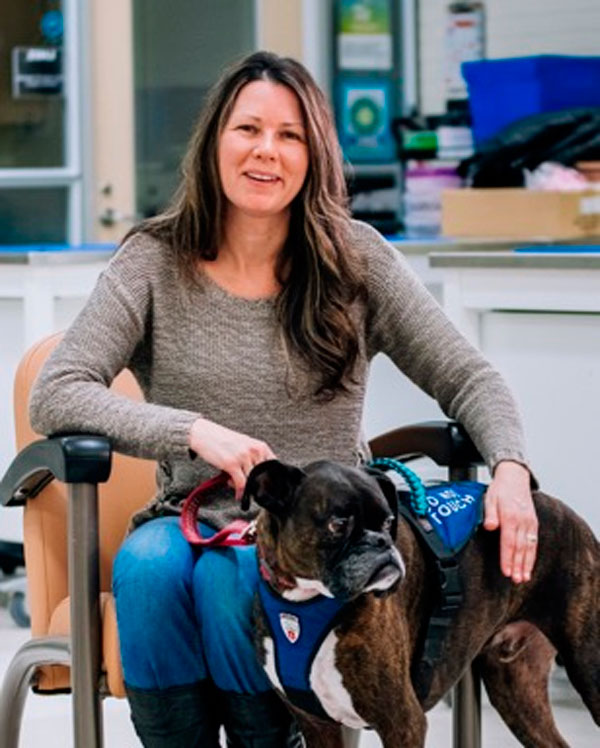
“She keeps me out of the dark and that’s where I’d like to stay.” – Veteran Paul de Groot
University of Saskatchewan (U of S) researcher Colleen Dell is running a $1.4 million program on how psychiatric service dogs help veterans with Post-Traumatic Stress Disorder (PTSD) recover from addictions.
The three-and-a-half-year national program is called A PAWSitive Support Project for Veterans with PTSD and who Problematically Use Substances. It’s a partnership between six universities and a dozen community organizations.
Health Canada awarded Dell $850,000—she’s a U of S sociology professor focusing on addictions and animal-assisted interventions. AUDEAMUS, a veteran-run non-profit service dog organization, is also helping fund the project with $360,000 and the U of S with $175,000.
In the video accompanying its announcement, Dell explained the first step will be to develop a toolkit on substance use recovery. Then, they’ll test the kit with 30 veterans from AUDEAMUS, and distribute it to other service dog organizations.
She said the research is patient-centered: “This approach gives us a glimpse of the struggles that the veterans are facing with substance use and also how the dog is an important part of their recovery and at the same time, we’re also working with the dogs as co-researchers in many ways on our projects because we’re learning from them as well.”
The research team consists of over 30 people from various organizations, and they’ll be guided by an Indigenous elder.
Veteran Paul de Groot was involved in the pilot study and is now on the project’s team. In the video, he’s with his service dog in training named Raven.
“I know for certainty that I wouldn’t be where I am today without having…Raven with me,” he said. “She keeps me out of the dark and that’s where I’d like to stay.”
According to a Veteran Affairs Canada study, psychiatric service dogs for PTSD will wake the veteran from a nightmare and improve sleep, slightly increase their physical activity, moderate long-lasting reduction in depressive symptoms and help them integrate into the community.
The U of S pilot study found service dogs also decrease problematic substance use and prescribed medication.
“I think all the service dog providers that are out there need to stand together as one,” said de Groot.
“You might have veterans or first responders that are in your programs that they need this help and you might not see it, but if they can get that help that’s coming out of this research study, it’s gonna help you, it’s gonna help them and it’s gonna make a more positive and strong experience for everybody in whole—but we’ve all got to be able to work together to get to that point,” he added.
“Lives depend on it.”
Michael Richards is another veteran featured in the video. His service dog in training is named Felix.
“When I didn’t have a service dog, I didn’t want to go out. I didn’t want to meet people. I thought about suicide a lot, but it started to change,” explained Richards.
“One little bit at a time and I can honestly say now I don’t have suicidal thoughts anymore. I don’t say I don’t have bad days, but when I do have bad days, I’ve got Felix.”
The preliminary research began about three and a half years ago with support from the Canadian Research Initiative in Substance Misuse and the Saskatchewan Centre for Patient-Oriented Research.
Dell is also the Centennial Enhancement Chair in One Health and Wellness at the U of S’s College of Arts and Science.

